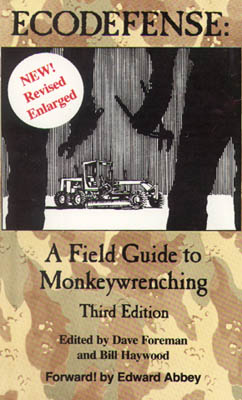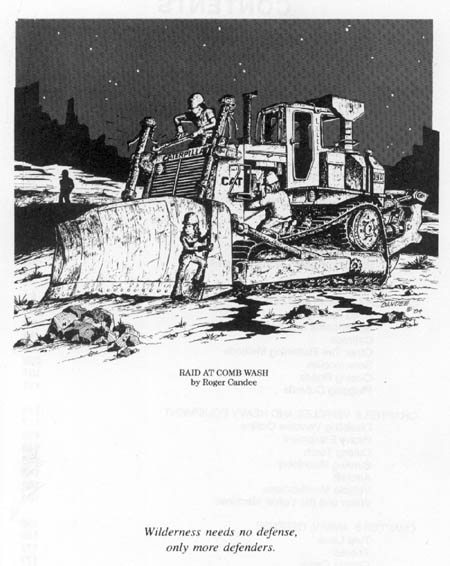
This
book is dedicated to
Edward Abbey 1927-1989
John Zaelit (Mr. Goodwrench) 1954-1986
Bill Turk (The Mad Engineer) 1953-1992


[A
note from the web-publisher: I put this up to make ecodefence information
available to more people in these times of social/ecological crisis. The book
is too expensive, hard to find, and there are obvious security risks to buying
it through the mail from outfits like amazon.com. I hope you will download,
print-off and pass it out to people in your area. Also, I want you to reproduce
this information on other websites, so that in the event that this site is
closed down - there are dozens of others with Ecodefense still
available. Do understand that this is a hot item for the Feds and will likely
be suppressed quickly. So it’s important that reproduction and distribution
occur as soon as possible, please help! Reproduction involves some security
risks. It has been said that Dave Foreman sued some Australian eco-anarchists
when they bootlegged it, so the key here is anonymity, don’t have any contact
info associated with this book, and don’t have any website this information is
copied to associated with you. To the destruction of the megamachine.]
|
CONTENTS |
|
|
Introduction
to the Third Edition |
1 |
|
FORWARD! by Edward
Abbey |
3 |
|
5 |
|
|
12 |
|
|
17 |
|
|
Tree
Spiking |
18 |
|
Tree
Pinning |
32 |
|
Ceramic
Spikes |
39 |
|
Rock
Spikes |
45 |
|
Plastic
and Wood Pulp |
50 |
|
Survey
Stakes |
52 |
|
Mining |
61 |
|
Powerlines |
62 |
|
Seismographic
Lines |
66 |
|
Plugging
Waste Discharge Pipes |
72 |
|
Grazing |
76 |
|
87 |
|
|
Road
Spiking |
89 |
|
Spikeboards
and Nailboards |
98 |
|
Caltrops |
99 |
|
Other
Tire Flattening Methods |
102 |
|
Snowmobiles |
106 |
|
Closing
Roads |
107 |
|
Plugging Culverts |
111 |
|
116 |
|
|
Disabling
Vehicles Outline |
117 |
|
Heavy
Equipment |
118 |
|
Cutting
Torch |
143 |
|
Burning
Machinery |
145 |
|
Aircraft |
148 |
|
Vehicle
Modifications |
152 |
|
Water and Big
Yellow Machines |
156 |
|
158 |
|
|
Trap
Lines |
159 |
|
Snares |
177 |
|
Coyote
Getter |
177 |
|
183 |
|
|
Urban
Monkeywrenching |
184 |
|
Slingshots |
188 |
|
Condo
Trashing |
190 |
|
Computer
Sabotage |
191 |
|
Stink
Bombs |
197 |
|
Smoke
Bombs |
201 |
|
Jamming
Locks |
203 |
|
Disrupting
Illegal Activities |
205 |
|
Trash
Return |
205 |
|
Mountain Bikes |
207 |
|
210 |
|
|
Advanced
Billboarding |
211 |
|
Billboard
Trashing |
217 |
|
Billboard
Revision |
219 |
|
Burning
Billboards |
221 |
|
Paint
Remover |
222 |
|
Posters
and Silent Agitators |
223 |
|
Correcting
Forest Service Signs |
226 |
|
Spray
Paint Slogans |
228 |
|
Stencils |
231 |
|
233 |
|
|
Basic
Security |
234 |
|
Military
Movement |
242 |
|
Rules
of Security |
243 |
|
Disposing
of Evidence |
245 |
|
Avoiding
Arrest |
249 |
|
Camouflage |
251 |
|
Tools
of the Trade |
256 |
|
Radios
and Communications Equipment |
260 |
|
Eyes
of Night |
270 |
|
Tracking |
274 |
|
Car
Camping |
278 |
|
Daily
Routine |
280 |
|
Mental
Conditioning |
282 |
|
Surveillance |
285 |
|
Counterintelligence |
290 |
|
Advanced
Investigation Methods |
290 |
|
Police
Undercover Operations |
295 |
|
Countersecurity |
308 |
|
Pursuit
and Evasion |
319 |
|
Arrest |
327 |
|
Media
Relations |
328 |
|
General Security
Field Notes |
337 |
|
342 |
INTRODUCTION
TO THE THIRD EDITION
Ecodefense is a historical artifact. It be argued that it is the most controversial
environmental book ever published; more importantly, though, it is a key
exhibit in the legal history of freedom of the press in the United States. The
First Amendment to the United States Constitution was ratified in 1791. It
reads in part, Congress shall make no law
... abridging the freedom of speech, or of the press. That enshrined freedom of the press and speech sets the
United States of America apart from all other nations. No other country so
jealously defends the right of its citizens to speak and publish controversial
ideas.
Several years ago when Australia banned the importation and
sale of Ecodefense, it was not possible for the United States to follow
suit-because of the First Amendment. Instead, the United
States government spent several million dollars, employed a small army of FBI
agents, and entrapped a number of citizens in 1987-89 in an effort to suppress
publication and distribution of Ecodefense.
That attack on free speech and the freedom of the press glares like a
pustulating boil in American history just as do the Alien and Sedition Acts,
the Palmer Raids, and McCarthyism.
We at Abbzug Press believe that the Bill of Rights is like a
set of muscles-if they aren't exercised, they atrophy. Therefore, it is our
patriotic duty to defend the First Amendment to the United States Constitution
and publish a new Third Edition of Ecodefense: A Field Guide to Monkeywrenching.
Efforts to suppress Ecodefense
and to entrap its co-editor, Dave Foreman, have been well covered elsewhere
and we will not go into them here. Nor will we here attempt to justify the
practice or necessity of monkeywrenching. Edward Abbey's Forward! and the first
two chapters of this edition do that. Monkeywrenching is also justified in Ed
Abbey's novels The Monkey Wrench Gang and Hayduke Lives!, Howie Wolke's Wilderness on the Rocks, Christopher Manes's Green
Rage, and, in greater detail, Dave Foreman's Confessions of
an Eco-Warrior.
We will here, however, rebut two myths about Ecodefense. First, it is widely believed
that Ecodefense (or Abbey's Monkey Wrench Gang) launched the
practice of monkeywrenching. In fact, ecological sabotage was widespread before
Ecodefense was first published in
1985 and even before The Monkey Wrench Gang was published in 1975.
The
second myth is that Dave Foreman wrote Ecodefense.
The first edition of Ecodefense was
a compilation of articles and letters sent to the Earth First! Journal by dozens of individuals. This Third Edition
has over two dozen major contributors and at least one hundred other
contributors. In this edition, we have given aliases to credit all articles and
significant field notes where the author did not offer her own alias. In the
previous editions, Dave Foreman and Bill Haywood compiled, edited, and arranged
the contributions. We have retained their names as editors for the Third
Edition since it is largely based on the previous editions.
There are changes in the Third Edition, however. Some
material deemed to be irrelevant or counterproductive has been dropped. Incorrect
information has also been dropped. Much new information has been incorporated.
Most of it was contributed between 1987 and 1989. A professional editor was
retained to rewrite, copy edit, arrange, and otherwise clean up all of the
text. Some previous material has been rearranged.
Edward Abbey and two other contributors, John Zaelit and
Bill Turk, have died since the First Edition of Ecodefense. This Third Edition is dedicated to their memories and
to the fierce green fire that burned in their eyes. They were heroes, defenders
of their native land.
We
thank the other defenders of the land who contributed to Ecodefense, though they must remain anonymous. It is their book.
When
we began work on the Third Edition we asked Dave Foreman for any thoughts he
might offer to today's reader of Ecodefense.
He responded:
Is your act a
strategic one, or is it merely an inarticulate yell, conveying only rage,
alienation, and despair? Monkeywrenchers must constantly ask themselves:
Who is my audience?
What is my message?
Will this deter destruction?
Are there legal means not yet used?
Of
course this Third Edition of Ecodefense, like
those before it, is meant only to entertain. No one should take it seriously.
Matthew Lyon
for
Abbzug Press
FORWARD!
by Edward Abbey
If a stranger batters your door down with an axe, threatens
your family and yourself with deadly weapons, and proceeds to loot your home of
whatever he wants, he is committing what is universally recognized-by law and
morality as a crime. In such a situation the householder has both the right
and the obligation to defend himself, his family, and his property by whatever
means are necessary. This right and this obligation is universally recognized,
justified and even praised by all civilized human communities. Self-defense
against attack is one of the basic laws not only of human society but of life
itself, not only of human life but of all life.
The American wilderness, what little remains, is now
undergoing exactly such an assault. Dave Foreman has summarized the character
and scale of the assault in the first chapter of this excellent and essential
book. With bulldozer, earth mover, chainsaw and dynamite the international
timber, mining and beef industries are invading our public lands-property of
all Americans bashing their way into our forests, mountains and rangelands and
looting them for everything they can get away with. This for the sake of
short-term profits in the corporate sector and multi-million dollar annual
salaries for the three-piece suited gangsters (M.B.A., Harvard, Yale,
University of Tokyo, et alia) who
control and manage these bandit enterprises. Cheered on, naturally, by Time, Newsweek
and the Wall Street Journal, actively encouraged by those jellyfish Government agencies
which are supposed to protect the public lands, and as always aided and abetted
in every way possible by the quisling politicians of our Western states (such
as Babbitt, DeConcini, Goldwater, Hatch, Garn, Symms, Hansen, Wallop,
Domenici-to name but a few) who would sell the graves of their own mothers if
there's a quick buck in the deal, over or under the table, what do they care.
Representative democracy in the United States has broken down. Our
legislators do not represent those who elected them but rather the minority
who finance their political campaigns and who control the organs of communication-the
Tee Vee, the newspapers, the billboards, the radio-that have made politics a
game for the rich only. Representative government in the USA represents money
not people and therefore has forfeited our allegiance and moral support. We owe
it nothing but the taxation it extorts from us under threats of seizure of
property, or prison, or in some cases already, when resisted, a sudden and
violent death by gunfire.
Such is the nature and structure of the industrial megamachine (in Lewis Mumford's term) which is now attacking the American wilderness. That wilderness is our ancestral home, the primordial homeland of all living creatures including the human, and the present final dwelling place of such noble beings as the grizzly bear, the mountain lion, the eagle and the condor, the moose and the elk and the pronghorn antelope, the redwood tree, the yellowpine, the bristlecone pine, even the aspen, and yes, why not say it?, the streams, waterfalls, rivers, the very bedrock itself of our hills, canyons, deserts, mountains.
For many of us, perhaps for most of us, the wilderness is as
much our home, or a lot more so, than the wretched little stucco boxes, plywood
apartments, and wallboard condominiums in which we are mostly confined by the
insatiable demands of an overcrowded and ever-expanding industrial culture. And
if the wilderness is our true home, and if it is threatened with invasion,
pillage and destruction-as it certainly is-then we have the right to defend
that home, as we would our private rooms, by whatever means are necessary. (An
Englishman's home is his castle; an American's home is his favorite fishing
stream, 'his favorite mountain range, his favorite desert canyon, his favorite
swamp or patch of woods or God-created lake.)
The majority of the American people have demonstrated on
every possible occasion that they support the ideal of wilderness preservation;
even our politicians are forced by popular opinion to pretend to support the idea; as they have learned, a vote against
wilderness is a vote against their own re-election. We are justified in
defending our homes-our private home and public home not only by common law
and common morality but also by common belief. We are the majority; they-the
greedy and powerful-are the minority.
How best defend our wilderness home? Well, that is a matter
of strategy, tactics and technique, which is what this little book is about.
Dave Foreman explains the principles of ecological defense in the complete,
compact and conclusive pages of his short introduction. I can think of nothing
I could add nor of anything I would subtract; he says exactly what needs to be
said, no more and no less.
I am happy to endorse the publication of Ecodefense. Never was such a book so
needed, by so many, for such good reason, as here and now. Tomorrow might well
be too late. This is a book that will fit handily in any saddlebag, in any
creel, in any backpack, in any river runner's ammo can-and in any picnicker's
picnic basket. No good American should ever go into the woods again without
this book and, for example, a hammer and a few pounds of 60-penny nails. Spike a few trees now and then whenever you enter an area
condemned to chainsaw massacre by Louisiana Pacific and its affiliated
subsidiary the U.S. Forest Service. You won't hurt the trees; they'll be
grateful for the protection; and you may save the forest. My Aunt Emma back in
West Virginia has been enjoying this pleasant exercise for
years. She swears by it. It's good for the trees, it's good for the woods, it's
good for the earth, and it's good for the human soul. Spread the word-and carry on!
Edward
Abbey
July 1984
Oracle, Arizona